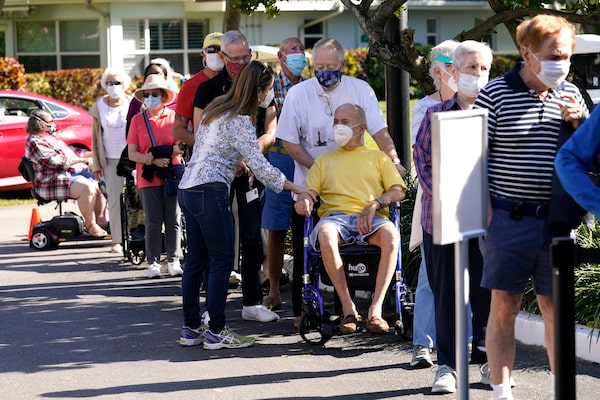
Robert Birkenmeier, center, waits in line with other residents to receive the Pfizer-BioNTech COVID-19 vaccine, Jan. 19, 2021, at John Knox Village in Pompano Beach, Fla.Lynne Sladky/The Associated Press
Florida has begun cracking down on COVID-19 “vaccine tourism,” reversing course on an earlier position that residents and visitors alike would be eligible for vaccinations.
Jackson Health System, the state’s largest public hospital system, has revised its policy to require anyone seeking a COVID-19 vaccine to provide proof of U.S. residency.
Under the new policy, updated this week, those looking to be vaccinated must bring one piece of U.S. government photo identification bearing their date of birth. Those with identification issued by a foreign government, such as Canadians, must bring two documents to prove that they live in the U.S., such as a utility bill or property tax statement.
Lidia Amoretti, a spokeswoman for Jackson Health, said the health system wants to ensure ready access to the vaccine for anyone who lives in the U.S., regardless of where in the country they reside or their immigration status. But, it wanted to “ensure the vaccine is not distributed to ‘vaccine tourism,’” she said.
In December, Florida Governor Ron DeSantis said vaccines would be prioritized for seniors over younger essential workers, with no discerning between full-time or seasonal residents. The Florida Division of Emergency Management said all Floridians and visitors would be eligible.
Canada has strongly advised against non-essential travel for months, but some are still choosing to buck federal guidance to head south to warmer climes. On Tuesday, Prime Minister Justin Trudeau said Ottawa could impose new travel restrictions without advance notice and again urged Canadians to cancel any booked trips.
Martin Firestone, president of Travel Secure Inc., a travel insurance brokerage in Ontario, estimated that 70 per cent of his regular snowbird clientele followed advice late last year and chose to stay in Canada.
“Then in January, they started getting calls from their friends down there in the retirement communities, or in their condos, going, ‘I just had my first shot today,’ and they go, ‘What?’” he said.
“Sure enough, the governor basically said 65 years and older, resident, non-resident, you’re entitled to the shot. So we got a huge uptick in calls at that point. … Their mentality was: I wasn’t going to go down and open up my place this year, but I’m going to head south now because in Canada I’m looking at September in some cases.”
The revised policy will affect Canadian snowbirds in the Sunshine State who rent properties or stay with others and have no ownership, Mr. Firestone said.
On Tuesday, Gov. DeSantis confirmed the vaccines would be prioritized for those who reside, at least some of the time, in the state.
“We do have part-time residents who are here all winter; they go to doctors here, and that’s fine,” he said at a news conference on vaccine distribution sites.
“What we don’t want is people – tourists, foreigners … obviously we want to put people who live here first in line.”
Our Morning Update and Evening Update newsletters are written by Globe editors, giving you a concise summary of the day’s most important headlines. Sign up today.
 Andrea Woo
Andrea Woo